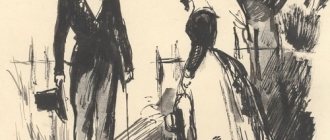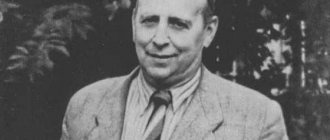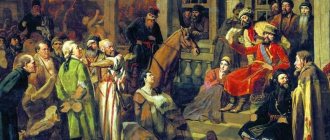History of creation
The dramatic work was written by Mikhail Yuryevich in 1835. Initially the play consisted of three chapters. Later, the author added a fourth act, covering the unpleasant ending of the previous version (Nina’s death). Lermontov dreamed of seeing drama on the theater stage, so he submitted the work to the dramatic censorship. At that time, the department was headed by the chief of gendarmes Benkendorf.
The text of the writer's work came under censorship. Too strong passions were not acceptable then. The censor was outraged by the fact of misunderstanding and, in some way, ridicule of costume balls in Engelhardt’s house. The work was returned to the creator for revision. Lermontov did not want to radically change the concept and plot, so he simply added a fourth act . A new character burst into the contents - an unknown one. Through the image of a hero, fate punishes Arbenin.
The second edition also did not pass censorship. The enraged writer overhauls the work, resulting in a new work that is consonant with the name of the main character. Censorship does not allow the play to pass even in this form. Most likely, the reason for the triple refusal was the mention of Nastasya Pavlovna’s name in all versions, which would have opened the public’s eyes to the real incidents underlying the plot of the work.
Now only the second edition is known to the world; other attempts on paper have not survived. Reading the play in its entirety is sometimes inconvenient because it is written in verse. A summary of all four chapters will help the reader more easily understand the material, presented in simple words.
Lermontov and his character
But the author’s character was difficult, one might say very difficult. He had to fight a duel twice in his life, but most likely there were more reasons for this; it’s just that, given his talent, the poet was forgiven a lot. For example, the first impression of him that V. G. Belinsky formed upon meeting him turned out to be quite bad. The critic considered the young man frivolous and inclined to make fun of things that were not funny. The “frantic Vissarion,” however, changed his opinion after talking with Mikhail Yuryevich while he was serving time in the guardhouse for participating in the (first) duel.
It should be noted that the poet did not gain much fame: in 1840, his first book (a collection of poems) was published, which turned out to be his last during his lifetime. To many around him, including his own grandmother, he seemed to be a arrogant writer who overestimated his talent, which undoubtedly affected his character, who was already hot-tempered and cocky. Lermontov wrote “Masquerade” about such a person, a brief summary of which will be presented in this article. The death of the poet in a duel fits well into the outline of the author’s general worldview. Portraying Arbenin, he is merciless to himself. Like his main character with Zvezdich, he himself created a conflict with Martynov. The death of M. Yu. Lermontov did not evoke sympathy in secular society.
Characters
Since the work is written in the form of a play, there are many main and minor characters. You can get to know them better by reading the drama in its entirety. In a brief summary, when filling out a reader’s diary or writing an essay on Lermontov’s “Masquerade,” it is enough to reflect only the images of the characters:
- Evgeniy Aleksandrovich Arbenin is a wealthy nobleman trying to gain freedom from the rules of modern society, showing his rebellious spirit and intelligence.
- Nina is Evgeniy’s wife with a tragic fate.
- Zvezdich is a prince who loves to play cards.
- Shtral is a baroness, Nina's friend.
- Afanasy Pavlovich Kazarin is a deceiver who fuels the protagonist’s jealousy.
Also in the work, an important role is played by such characters as an official, a mask, players, guests, and servants. At the center of the event is the hero of the dramatic play, Arbenin, endowed with intelligence, great will and considerable material resources.
As a representative of high society, he has been associated with high society since his appearance. The central character fails to achieve the desired freedom due to a fatal mistake.
Other characters
- Baroness Shtral , a society lady, gave Zvezdich a found bracelet during a masquerade.
- Shprikh is a “Jew” who knows everything about everyone, “he knows everyone, he has business everywhere.”
- Kazarin is an acquaintance of Arbenin, a card player.
- The unknown is an old acquaintance of Arbenin, “the hand of Fate.”
And we also have:
for the most impatient -
A very brief summary of “Masquerade”
for the busiest -
Reader's diary "Masquerade"
Brief retelling of the play
The work begins with a game of cards. They play bank at the table. Evgeniy Alexandrovich saves the reputation of Prince Zvezdich. Together the men go to a masquerade, where Arbenin’s wife Nina is already there. The prince meets a mysterious woman (a friend of Evgeniy’s wife). gives the attractive young man a bracelet as a souvenir of the flirtations and acquaintance . The decoration, as it turns out, actually belonged to Nina.
Arbenin notices the loss. The jealous husband begins to accuse Nina of obscenity, as if she were the lady. To dispel unfounded speculation, the desperate wife goes to Baroness Strahl, who was hiding under a mask that evening. At this time, the nobleman finds a letter addressed by Zvezdich to Evgeniy’s wife. Almost every representative of St. Petersburg secular society learns about “treason.” Arbenin wants to kill the prince and punish his unfaithful wife.
Another ball ends in tragedy. A jealous man puts poison in a bowl of ice cream for his wife. He bought the poison in his youth, when he lost badly at cards and wanted to take his own life. Arriving home, Nastasya Pavlovna (Nina) tries to explain everything to her husband. He loves her, wants to believe her, but jealousy clouds his eyes . The heroine dies from poisoning.
A stranger and Zvezdich enter the house of the central character. Both want to avenge the unfortunate woman, because in their hands is a letter of exculpation from the baroness. Having learned the truth, Evgeniy Alexandrovich goes crazy.
Lermontov “Masquerade”, act 2 – summary
Scene 1
Exit 1. Baroness Strahl, sitting at home, reflects on the cruelty of the world, which is ready to harshly judge every heartfelt passion of a woman. From the words of the baroness it becomes clear that it was she who tried to captivate Prince Zvezdich at the masquerade.
Exit 2. Nina Arbenina comes to the baroness with an exhausted and sad look.
Exit 3. Prince Zvezdich also arrives, laughingly telling that he was at a masquerade yesterday and, it seems, recognized some of the ladies he knew under the masks. The Baroness, barely hiding her anxiety, shames the prince for his frivolity.
Exit 4. The Baroness leaves for a while. Left alone with Zvezdich, Nina tells him that she lost one of her two identical bracelets. Zvezdich sees that the second one, not lost, is exactly the same as the one that the unknown woman gave him at the masquerade. The prince concludes from this that this unknown person was Nina and tries to playfully flirt with her. Nina indignantly demands that the prince not forget himself and hurries to leave.
Exit 5. Baroness Shtrahl returns. The annoyed Zvezdich shows her the bracelet given to him at the masquerade, telling her how he just saw Nina’s second one. The Baroness advises him to value the honor of the ladies more. The prince is leaving.
Exit 6. Left alone, the baroness fears that the frivolous Zvezdich might guess who the donor of the bracelet really was and spread the word about it to the whole society. Shtral decides to save himself even at the expense of Nina.
Exit 7. Shprikh comes to the Baroness. She tells him that there are supposedly already rumors in the world about a love story between Zvezdich and Nina Arbenina.
Exit 8. Shprikh, offended by Arbenin, rejoices at his shame and decides to spread the news about this to all his friends.
Scene 2
Exit 1. Alone at home, Arbenin is tormented by the thought of his wife’s possible betrayal. The servant unexpectedly informs him that a certain messenger brought Nina a note.
Arbenin. Illustration for Lermontov’s drama “Masquerade” by artist N. Kuzmin
Exit 2. Kazarin comes to Arbenin, whose financial affairs have been very bad lately. To correct them, Kazarin is looking for a way to again drag Evgeniy into the cheating gambling he abandoned long ago.
Exit 3. In Arbenin’s hallway, Kazarin meets Shprikh - it was he who brought the note to Nina. It turns out that from Baroness Shtral Shprikh immediately went to Prince Zvezdich and advised him not to stop harassing Evgeniy’s wife. The prince immediately wrote a love note to Nina, which Shprikh delivered to the Arbenins’ house.
Exit 4. Arbenin enters the room, reading Zvezdich’s note given to him by the servant. In his excitement, he does not even notice Kazarin and Shprikh. Evgeniy is bitterly indignant at the ingratitude of the prince, whom he recently helped so much, and at Nina’s “treachery.” Shprikh hurries to leave unnoticed.
Exit 5. Seeing Kazarin, Arbenin complains to him about human betrayal. Kazarin responds by saying that you just need to understand the futility of empty expectations of good from others - and thus free yourself from the contrived duty of doing good to them. Kazarin reminds Evgeniy of their former life among revelry, deception and risk, which they both liked so much. To Kazarin’s great joy, Arbenin furiously exclaims that from now on he will “break his alliance with virtue.”
Scene 3
Exit 1. Preparing revenge on Zvezdich, Arbenin comes to him. The prince is sleeping.
Exit 2. Arbenin opens the door to Zvezdich’s room. For a moment, a desire flares up in him to kill the prince right now, while he is sleeping. But he overcomes this impulse, closes the door, writes Zvezdich a note inviting him to a card game today and leaves.
Exit 3. At the door, Eugene unexpectedly runs into Baroness Shtral. He mockingly asks why women are so attracted to Zvezdich that she herself came to him. The Baroness understands that Eugene is going to take cruel revenge, and passionately tries to explain to him: Nina is not guilty of anything. The angry Arbenin does not want to listen to her and leaves.
Exit 4. The Baroness goes to the Prince.
Exit 5. The awakened Zvezdich is very surprised to see her in front of him. The Baroness says: there are already rumors in the world about the prince’s daring letter to Arbenin’s wife. She warns that Evgeniy is very dangerous, admits to Zvezdich that the bracelet at the masquerade was given to him not by Nina, but by her, and leaves.
Exit 6. Zvezdich reads Arbenin’s note brought by the servant. Seeing in her a kind invitation to dinner with a mutual friend, the prince decides that Eugene has nothing to fear for now.
Scene 4
Exit 1. Arbenin and Kazarin are waiting for Zvezdich. Kazarin is looking forward to how Evgeniy will now “pluck” the prince at cards.
Exit 2. Zvezdich enters. Arbenin invites him to the card table. While playing, Eugene, under the guise of an “anecdote,” tells the prince a story about how one man rendered an important service to a friend, and he “in gratitude” seduced his wife. Having finished the story, Arbenin suddenly accuses Zvezdich of cheating the cards and throws the deck in his face. The stunned prince does not know what to do. Rushing about, he first threatens to kill Evgeniy, but his resolve quickly cools down. Realizing that, having failed to adequately respond to the insult, he is now disgraced forever, Zvezdich falls and covers his face with his hands. Evgeniy ridicules him angrily and leaves.
Stage productions
Lermontov’s work “Masquerade” was not only published, but also staged in theaters. The play was first staged in 1852. Playwrights could easily create masterpieces on the theater stage based on the plot of Mikhail Yuryevich’s drama after the censorship ban was lifted in the same year.
Chronology of the stage history of "Masquerade":
- On January 13, 1864, the presentation of the full-size play “Masquerade” took place on the stage of the Alexandria Theater.
- A rerun of the popular play on January 15 and three times in February.
- Resumption of the performance after a long break in 1889. There was only one performance in honor of Sazonov's benefit performance.
- The beginning of a rapid stage life in 1917. It was then that the premiere of the work recreated by Golovin took place.
The dramatic play was also staged at the Vakhtangov Theater in Moscow. The music for the play was written by Khachaturian.
Given the circumstances, the work had to “leave” the theatrical stage.
Spouse
The wife, Nastasya Pavlovna, at first glance is just an angel. The resemblance to cherubs and seraphim gives her youth, bordering on a childish perception of the world around her. She is much younger than her husband and cannot understand his rebellious nature. He suddenly becomes gloomy, gloomy and unkind, and his wife is surprised, indignant and depressed, suspecting that Arbenin has stopped loving her. M. Yu. Lermontov’s “Masquerade” dedicated a significant part to her image. The summary of her suffering comes down to the incompatibility of the desire to have fun, dance and have fun with her husband’s ideas about an ideal wife. She can easily come home from the ball later than one in the morning (she promised at twelve). The manner of kissing on the forehead irritates Arbenin, he is terribly jealous and wants a completely different attitude towards himself.
Climax
Arbenin poisoned his wife. This crime in itself is terrible, but what makes it especially cruel is the unwillingness to understand and believe the only person you love. Nina dies slowly, and the couple manage to talk for the last time. The poisoner does not listen to the baroness, who confessed to her treachery. However, gradually (too slowly) Arbenin understands his mistake, and the loss he suffered through his own fault. It’s too late to call a doctor, the main character sobs, repents, cries and declares his love to the dying victim who curses him.
Shprikh
Judging by the surname, from Russian Germans. He immediately evokes the antipathy of the main character with his duplicity (and maybe even multifacetedness with a much larger numeral). M. Yu. Lermontov, “Masquerade,” draws the reader’s attention to this hypocrisy by the title of the play. A brief description of Shprikh's appearance can be summed up in a few words: an evil smile and glass bead eyes. The detached opinion of Kazarin, who introduced Arbenin to this “devil-man,” is completely different; he characterizes the character as an extraordinary person, familiar with everyone, active, able to get along with people, and generally charming. You should be more careful with such people, but the main character does not listen to reason and for some reason conflicts with Shprikh.
First action: start
Before the reader is Prince Zvezdich , completely losing a game of cards. Shprikh, following his own interests, tries to give him a loan, but the officer proudly refuses.
Arbenin watches them with hostility. He knows very well what really happens at the card table. They are trying to frame Zvezdich, which is what the main character hints at. Arbenin explains that you cannot pick up cards if you don’t know how to win and don’t know the rules, otherwise you will be considered a loser. Out of pity, Evgeniy takes it upon himself to get even for Zvezdich and pays off his debts, successfully leaving the party behind him. So that the prince does not feel guilty, Arbenin offers him a joint trip to the masquerade.
The heroes go to a holiday, where a certain lady in a mask flirts with the prince. She gives Zvezdich a gift - a bracelet. At this time, Arbenin quarrels with a man he doesn’t know, who prophesies trouble for him. He offends Shprikh, hinting that his wife is cheating on him. Zvezdich shows Arbenin the trophy he received. Evgeniy discovers that the bracelet belongs to his wife Nina. At home, he throws a scandal at her, not listening to any excuses.
Prince Zvezdich
The officer is brilliant, but he is a narrow-minded person. He willingly believes in his irresistibility, without thinking, he sits down to play the game, obviously understanding it a little, and is touchy. Apparently, the author himself felt particular annoyance with such types; Lermontov wrote “Masquerade” about them. A brief summary describing the personal characteristics of the characters hints at some of Zvezdich’s stupidity, his naivety and ignorance of the human race. However, with all this, Arbenin helps out Zvezdich, who finds himself in an extremely difficult situation. But more on that later.






